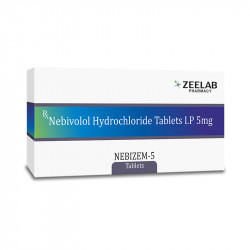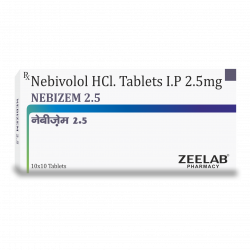Nebivolol
Nebivolol is a medication that is used to treat high blood pressure and some heart problems. It slows the heartbeat, relaxes the blood vessels, improves blood flow, and reduces the heart's workload. By doing this, nebivolol can lower the chance of serious problems like stroke, heart attack, and heart failure. It best manages the blood pressure and related complications when taken under medical supervision.
Available Medicine for Nebivolol
Uses of Nebivolol
- Treats High Blood Pressure: Helps lower high blood pressure by relaxing blood vessels and slowing the heart rate. It reduces strain on the heart, making it easier to pump blood, and helps in preventing damage caused by long-term high pressure.
- Reducing Heart Complications: Controls blood pressure, decreases the heart's workload, and lowers the risk of major heart problems. It can reduce the chances of stroke, heart attack, Angina (chest pain), and heart failure, keeping your heart and circulation healthier in the long run.
- Improves Blood Circulation: Relax blood vessels, improving blood flow throughout the body. Better circulation helps deliver oxygen and nutrients to vital organs and muscles. It supports energy levels, reduces heart strain, improves circulation, and promotes overall well-being.
- Maintain Overall Heart Health: Protect the heart by lowering stress on it, improving circulation, and reducing risks of future problems. With consistent use, it supports long-term heart function and helps manage blood pressure. It helps to maintain a healthier, stronger heart and overall well-being.
How Nebivolol Works
Nebivolol works by blocking beta receptors in the heart, slowing down the heart rate and reducing the force of contraction. This action helps to lower blood pressure and reduce strain on the heart. Additionally, Nebivolol helps to relax blood vessels, improving blood flow and reducing the workload on the heart.
Benefits of Nebivolol
- Effective in lowering high blood pressure
- Helps improve heart function in patients with heart failure
- Well-tolerated with a lower risk of side effects compared to other beta-blockers
- Can be used long-term to manage cardiovascular health
How to Take Nebivolol
Nebivolol is typically taken once daily, with or without food. It is important to take the medication at the same time each day to maintain consistent levels in the bloodstream. Follow your healthcare provider` s instructions regarding dosage. Do not stop taking Nebivolol suddenly, as this may worsen your condition.
Type of Dosage Available
- Nebivolol 5 mg tablets
- Nebivolol 10 mg tablets
Side Effects of Nebivolol
- Common side effects: dizziness, fatigue, headache, and nausea.
- Serious side effects: slow heart rate, low blood pressure, shortness of breath, or swelling in the legs.
- If any severe side effects occur, seek medical attention immediately.
Safety Advice
- Consult your doctor if you have a history of heart disease, kidney problems, or asthma before taking Nebivolol.
- Monitor your blood pressure and heart rate regularly while on Nebivolol.
- Avoid abrupt discontinuation of the medication without consulting your healthcare provider.
- Use caution when operating machinery or driving if you experience dizziness or fatigue from the medication.
Frequently Asked Questions (FAQs)
Q: Can Nebivolol be taken with other medications?
A: Nebivolol can interact with certain medications. Always inform your doctor about all medications you are currently taking, including over-the-counter drugs and supplements.
Q: Is Nebivolol safe for long-term use?
A: Yes, Nebivolol is generally considered safe for long-term use when prescribed by a doctor and when taken as directed. Regular check-ups are important to monitor your condition.
Q: Can Nebivolol cause weight gain?
A: Weight gain is not a common side effect of Nebivolol, but some individuals may experience fluid retention. If you notice significant weight gain, consult your healthcare provider.
Disclaimer : Zeelab Pharmacy provides health information for knowledge only. Do not self-medicate. Always consult a qualified doctor before starting, stopping, or changing any medicine or treatment.
Download India's most affordable pharmacy app
- Compare with medicine prices
- Save upto 90% on your medicine bills

Temperature Controlled storage and delivery

Regular Sanitization

Disinfected Packaging















 Added!
Added!